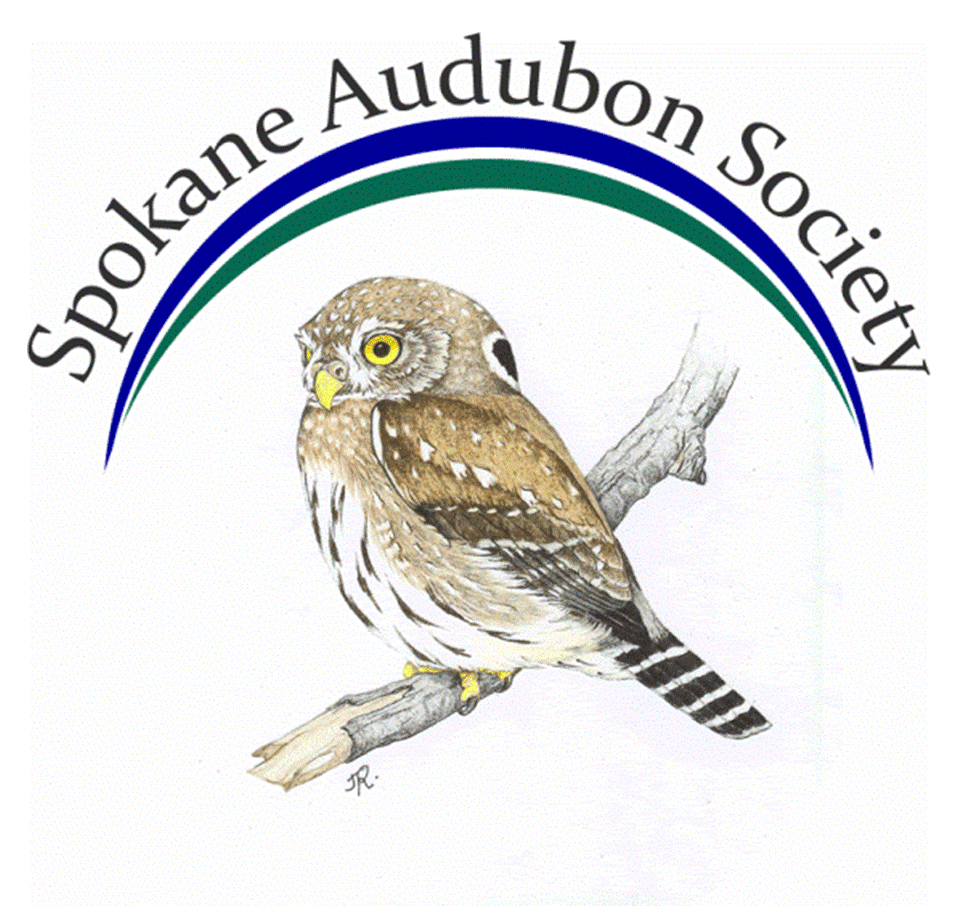Mike Borysewicz
Mike Borysewicz
by Madonna Luers
One of our newest Spokane Audubon Society board member brings a wealth of wildlife experience to chapter leadership.
Mike Borysewicz retired last December after 35 years as a wildlife biologist for the U.S. Forest Service. He spent 30 years on the Colville National Forest at the Sullivan Lake Ranger District, but also served earlier in his career on the Randle district of the Gifford Pinchot Forest, the Prairie City district of the Malheur Forest and the Wallowa-Whitman Forest in Oregon.
Among other wildlife species work, he conducted breeding bird surveys and specific surveys for Great Gray owls, Sandhill cranes, Spotted owls, Harlequin ducks, and Northern goshawks.
He says if he had to pick one favorite birding experience, it would be watching a Northern Goshawk “delicately devour” a snowshoe hare it had caught.
“Goshawks are an indicator/sensitive species on the national forests of Oregon and Washington,” Mike said, “so I spent a lot of time surveying for their nests, or teaching technicians to do so, for protecting their habitat according to established guidelines.”
His partner and fellow Audubon member Nan Berger was helping him with a U.S. Geological Service Breeding Bird Survey on the Colville Forest when they came across the bird on the shoulder of the road just before one of their established survey stops.
“We probably watched that goshawk dining on that hare for 15 minutes,” he recalls. “I especially love any and all raptors for their physicality, their beauty, and their intensity.”
Mike was born in 1959 in Somerville, New Jersey. He always loved being outdoors and seeing wildlife in general. His brother hunts and fishes and his other siblings appreciate nature, but his was the only path that led to a wildlife career.
“I think reading an article in National Geographic on David Mech’s work with wolves in Isle Royale National Park was the first catalyst I can remember,” he said. “In my senior year in high school, my best friend and I made a road trip to Yellowstone National Park and that’s when we decided we wanted to go to school out west.”
Mike enrolled in the University of Idaho in Moscow. He was initially interested in astronomy, but thought making that a career was a long shot. He became serious about birding during college, thanks to an Ornithology class taught by Don Johnson, who Mike considers “one of the best lecturers I ever had the privilege to know.” He earned a Bachelor of Science degree in Wildlife Management, working between semesters on the Red Ives Ranger District of the Idaho Panhandle National Forest.
When Mike and Nan retired they moved to Cheney to be near Turnbull National Wildlife Refuge, which affords them access to wildlands, birds, and other wildlife. Mike says Nan signed them up for a family membership in Spokane Audubon.
“We both love birds and thought attending field trips would be fun,” he said. “We were also looking for volunteer opportunities in retirement and thought maybe one avenue to facilitate that could be through the local chapter.”
Both are now leaders of the chapter’s Save-A-Bird Team. And since they helped with Christmas Bird Counts in the Newport, Washington area for years, they also helped with the Cheney count last season. The past three winters they have completed one to three winter raptor survey routes for Jeff Fleischer, the wildlife researcher coordinating that Audubon-endorsed citizen science project. As a board member, Mike hopes to help keep the bird rescue group going and to advance general public appreciation of birds and the many challenges they face.
His tip for beginning birders is to try to learn as many bird songs and calls as possible. “The need to develop this skill for breeding bird surveys was a paradigm shift for me,” he said. “You don’t necessarily have to see the birds to identify the species around you. Also, never stop learning. I’ll never be as good a birder as I’d like to be.”
Although not a parent, Mike thinks about how to engage youth in birding. “I think young people have a lot on their plates today,” he said, “and in so many ways they have it tougher than I did. But I don’t think birding is in danger of dying out. Young people perhaps care more deeply about the environment than any generation up to this point. It’s natural that a love of birding tends to develop later in life when you’re more settled, less stressed, and start thinking more about giving back.”
Mike believes the most important issue for the future of birds and birding is the loss of habitat to human development. “Birds need a place to simply exist,” he said. “Hand in hand with increasing development is the increasing disconnect of people with the natural world. You can’t value something if you don’t know about it. I also think that apathy, born of despair over the state of the world, poses a real danger to positive change.”







